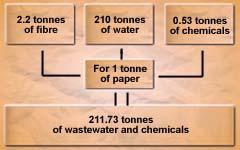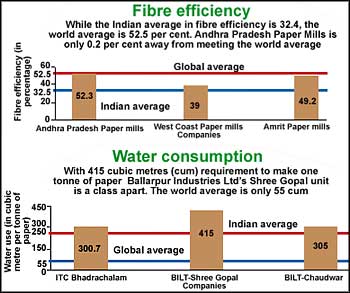
GAJARAULA
There is no evidence more conclusive about the state of air pollution in Gajraula, a sleepy industrial town in Uttar Pradesh, than the air itself. As one enters the town, breathing becomes difficult.

There is no evidence more conclusive about the state of air pollution in Gajraula, a sleepy industrial town in Uttar Pradesh, than the air itself. As one enters the town, breathing becomes difficult.
ANTI-POLUTION GIZMO: Diesel engines will be spewing less nitric oxide fumes, promise KMH, a Doncaster-based business house, and Leeds University in the UK. They have jointly developed a steam-based
Three Leaves Company<br><br>SCORE 38.50%<br>RANK TWO
SIV: On the comeback trail South India Viscose ( siv ) Ltd has a factory on the banks of river Bhavani in Sirumugai village of Coimbatore district, Tamil Nadu. siv 's recent history is also the

One Leaf Company <BR><BR>SCORE 20.01<BR>RANK TWENTY SIX

CPCB asks generator manufacturer to recall its product, a first time for India

Overall environment health of the pulp and paper industry is far from healthy Inefficiency in resource use plagues the industry

Serious violations of environmental norms by pesticide manufacturers came to our notice through this shocking account by researchers from the department of zoology, Delhi University. They visited

Ana M Soto, professor at the Tufts Medical School at Massachusetts in the us, made an important discovery while working with breast cancer cells in 1989. She found that some of the tissues were

Scientists slam new US conditions on nuclear deal
Electricity prices in California are drastically increased to tackle the energy crisis

Create a culture that places a premium on human power

Farmers and livestock owners are herding in a fortune as the animal sciences go into overdrive and squeeze out maximum yields

GEORGE Monbiot's book, for which he risked his life, is a delightfully lucid piece of serious investigative journalism on the ecological destruction of the Amazon, which he describes as
USE OF additives, irradiation and the threat of pesticide residues and food-borne infections have led to the quality of diet being questioned these days as never before. Factory Farming comes as a

A NORTHEAST TAPESTRY: SIX DOCUMENTARIES ON THE NORTHEAST BY INDEPENDENT FILMMAKERS. Produced by Indira Gandhi National Open University (IGNOU). India International Centre, New

Some now ways of using fortilisers which will prevent nitrogen seepage into the water table

India hopes to earn Rs 200 crore every year exporting flowers mass produced in laboratories

Dutch export of flowers has fallen in the face of increasing competition from other countries and a drop in the quality of plants at home.

A recent finding shows that over 35 billion tonnes of 'mysteriously missing' carbon dioxide from fossil fuels burnt over four decades went to ground in the coniferous forests of the North.